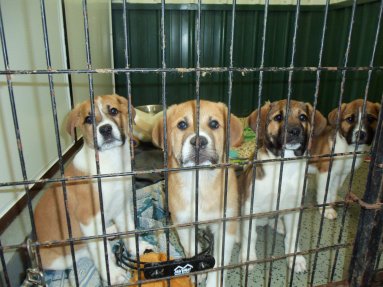Puppies in need of ‘fur’ever home

SUBMITTED PHOTO
These beautiful shepherd/collie puppies are anxiously awaiting their “Forever Home” and are presently at the Ripley County Humane Society.
Recently the Ripley County Humane Society accepted five shepherd/collie puppies. Even though the exact details of their birth are unknown, one thing is quite obvious – their mother was not spayed.
According to research, a female dog can produce two litters of puppies per year beginning at age one. The average litter size is five, which means that theoretically a single dog can give birth up to 70 puppies in her lifetime.
For cats, the birth numbers are higher. On average, a cat can have three litters of kittens per year with four kittens per litter. Female cats can reproduce basically throughout their entire life meaning they can have kittens for 12-15 years. That means one female could possibly have 180 kittens in her lifetime!
The question is: “What becomes of those puppies and kittens?” Many of them are abandoned or surrendered to animal shelters, where they anxiously await to be adopted into a “Forever Home”.
Unfortunately, many are also euthanized. According to the Best Friends Animal Society, some 347,000 cats and dogs were euthanized in 2021.
The solution to reducing the number of unwanted puppies and kittens is easily resolved by the neutering of male, and the spaying of female dogs and cats.
A spay, is a surgical procedure performed under general anesthesia. It involves removal of the female’s uterus, fallopian tubes and ovaries through an incision in the abdomen. Neutering is the surgical removal of a male’s testes. Also performed under general anesthesia, it is a simpler surgery than a spay. An incision is made near the front of the scrotum, then the testicles are removed through that incision.
Besides the obvious benefit of reducing the number of unwanted puppies and kittens, spaying or neutering can lead to a reduction in certain health risks for both female and male dogs and cats.
Female dogs and cats that have not been spayed can develop a painful and life-threatening infection of the uterus. They are also at a higher risk for mammary tumors.
Neutering a male dog or cat prevents testicular cancer and reduces the risk of other problems, such as prostate disease. A neutered dog or cat might also have less desire to roam.
The Ripley County Humane Society is fully committed to the neutering and spaying of dogs and cats prior to their adoption. Additionally, each animal is “fully vetted” before it is adopted into its “Forever Home.”
Of course these medical services are not without substantial costs to the shelter.
The RCHS is dependent upon adoption fees, which help to partially defray the costs associated with each animal. The shelter is also reliant upon the financial generosity of the public.
There are many ways to support the RCHS besides adopting a pet. Individuals who wish to learn more about how to help the cats and dogs should access their website at rchumane.com under “Ways to Help.”
Volunteers are also needed at the shelter located at 1202 W. County Road 150 N, Osgood, to exercise and socialize the animals. This human to animal relationship helps to prepare the animals for their hopeful adoption into a “Forever Home.”

